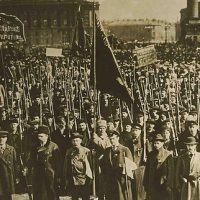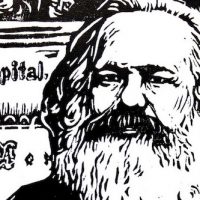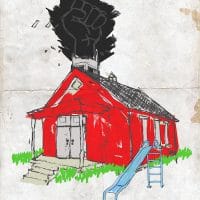-
The Bolshevik Revolution and the legacy of anti-imperialism
For those of us dedicated to revolutionary politics, taking control of this history is a crucial step towards building of international solidarity in the fightback against capitalist globalization and emergent neofascism, which is rearing its ugly head across the globe.
-
Why read “Capital”, 150 years later?
Out of all his works, the reputation of Karl Marx as theorist of the socialist tradition is undoubtedly based primarily on his magnum opus, Capital: A Critique of Political Economy.
-
Foreword to Creating an Ecological Society
As Fred Magdoff and Chris Williams point out in their new book, Creating an Ecological Society, the word “ecology” (originally œcology) was first coined in 1866 by Ernst Haeckel, Darwin’s leading German follower, based on the Greek word oikos, or household. Ironically, the word “economy,” to which ecology is often nowadays counterposed, was derived much […]
-
Mao reconsidered
“The simple facts of Mao’s career seem incredible.… Indeed Mao’s achievement is almost beyond our comprehension.” – John King Fairbank, The United States and China.
-
Jamaica, traffic lights, threats and knees
The left can only succeed and make gains by taking the lead in overcoming confusion and directing anger against those truly responsible for issues impacting the working class: in direct opposition to the scapegoating of conservatives and liberals alike.
-
A true spat-upon soldier story
The long-awaited The Vietnam War documentary by Ken Burns and Lynn Novick has arrived. It is powerful and moving, disturbing, enlightening, and challenging. But it is not without its omissions and distortions.
-
Making ‘Black Lives Matter’ in our schools
How do you kill Mr. Phil and nothing happens?” According to parent Zuki Ellis, this is the question students at J. J. Hill Montessori Magnet School in St. Paul were asking just a few days into summer. On June 16, the Minnesota police officer who fatally shot Philando Castile, or Mr. Phil as students knew him, was acquitted on all charges.
-
Cuba will never accept any preconditions or impositions
Speech by the Minister of Foreign Affairs of Cuba, Bruno Rodríguez Parrilla, during the 72nd Session of the United Nations General Assembly.
-
Third World Quarterly row: Why some western intellectuals are trying to debrutalise colonialism
Vijay Prashad explains his resignation from the editorial board of Third World Quarterly after it published an apologia for colonialism.
-
Merkel clobbered while rightists threaten
A key result of the German elections is not that Angela Merkel and her double party, Christian Democratic Union (CDU) and Bavarian CSU (Christian Social Union), managed to stay in the lead with the most votes, but that they got clobbered, with the biggest loss since their founding.
-
Memo to Jacobin: Ecomodernism is not ecosocialism
Ecomodernism is incompatible with ecosocialism. If Jacobin recognizes that and changes course, it can make important contributions to the fight against climate change.
-
What we sow is what we eat
Our treatment of the earth, of the dirt beneath our feet, is directly connected to our system of food production. The pollutants we put in the soil show up in our groceries. And the entire wretched business of agriculture derives from the nature of our economic system, which compels every giant corporation, every “entrepreneur,” to grow, to compete, to consider everything and everyone a commodity. Buy cheap, sell dear. These are the words that drive all of life.
-
Work, capital and the ‘administration of punishment’
Criminal justice and welfare policies routinely produce a distinct labour force in Britain, disposable by design. This article examines recent policy developments driving these labour forms, and explores their implications for the meaning of work.
-
In month after Charlottesville, papers spent as much time condemning anti-nazis as nazis
Since the Charlottesville attack a month ago, a review of commentary in the six top broadsheet newspapers—the Wall Street Journal, New York Times, USA Today, LA Times, San Jose Mercury News and Washington Post—found virtually equal amounts of condemnation of fascists and anti-fascist protesters.
-
Why do we still have employer sanctions?
The AFL-CIO was one of the main supporters of employer sanctions back in 1986. It only took 13 years for the labor federation to learn its lesson: in February 2000 it officially called for the elimination of the policy. Another 17 years have now passed, and the case against the sanctions has only grown more solid.
-
Not a duel, but a duet
Not even the stubbornest non-voters can ignore the coming Election Day in Germany, as always on a Sunday, September 24. With 34 parties, some state or local but most of them national, every stroll offers a wide choice of handsome, smiling candidate photos and bold clichés.
-
A lost document from the Cold War
This article covers the first substantive Internet posting and analysis of a unique Cold War document, the “Report of the International Scientific Commission for the Investigation of the Facts Concerning Bacterial Warfare in Korea and China.”
-
Unions edge closer to existential crisis
Our nation is often flummoxed by the chaotic and deceptive behavior of the Trump administration. Yet, these distractions disguise an economic agenda. That agenda is unapologetically determined to benefit corporate financial interests against the interests of all working people.
-
The struggle for a decent life
The typical working-class family would need an additional $91K+ per year in New York City just to break even on a reasonable standard of living.
-
Fascism in the United States
The combination of the Nazi flag and the Confederate flag is a standard feature of the Right’s iconography—the linkage between a desire for White domination with a rehabilitation of the ‘lost cause’ of the Confederacy. This period of great economic instability has produced some truly morbid symptoms.


















